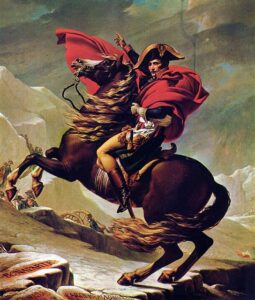The French Revolution was a period of radical social and political upheaval in France that lasted from 1789 to 1799. It was marked by the collapse of the Bourbon monarchy, the rise of Napoleon Bonaparte, and the eventual establishment of a new political order.
The Revolution began in 1789 with the storming of the Bastille, a symbol of royal tyranny and oppression. This event sparked widespread riots and civil unrest, and soon the people of France were calling for a new government. The monarchy, led by King Louis XVI, was unable to quell the unrest, and the king was eventually arrested and executed by guillotine in 1793.
With the monarchy gone, a new government was established, known as the First French Republic. This government was led by a group of radical politicians known as the Jacobins, who sought to implement a series of sweeping reforms. These included the abolition of feudalism, the redistribution of land, and the establishment of universal suffrage.
One of the key figures of the Revolution was Maximilien Robespierre, a leader of the Jacobins who played a key role in the Reign of Terror, a period of mass executions and political repression. He was arrested and executed in 1794, marking the end of the Reign of Terror.


Another key figure of the Revolution was Napoleon Bonaparte, a young military general who rose to power in the wake of the Revolution. He established himself as the leader of France, and went on to conquer much of Europe in a series of brilliant military campaigns. However, his ambition ultimately led to his downfall, and he was exiled to the island of Elba in 1814.
Despite its many successes, the French Revolution ultimately failed to achieve its goal of creating a truly egalitarian society. The Revolution was marked by widespread violence and political upheaval, and it ultimately led to the rise of a new dictator in the form of Napoleon.
However, the Revolution did have a profound impact on the world, and its legacy continues to be felt today. The ideas of liberty, equality, and fraternity that it championed have become synonymous with the French nation, and continue to inspire people around the world.
In addition, the French Revolution also had a huge impact on the other European countries and even beyond. The ideas of the revolution such as freedom, democracy, and popular sovereignty were widely spread and sparked similar movements in other countries. The French Revolution also marked the end of the absolutist monarchy and the emergence of constitutional monarchy and democracy in some parts of Europe.
In conclusion, the French Revolution was a significant event in world history that changed the political landscape of France and Europe. It was a period of radical social and political change, marked by the collapse of the monarchy, the rise of Napoleon Bonaparte, and the establishment of a new political order. The ideas of the revolution continue to influence the world today, and its legacy continues to be studied and debated by historians and scholars.


